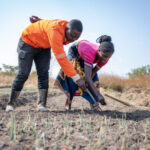Joy is not a word often associated with Makoko, the sprawling waterfront settlement on the fringes of Lagos. But last Thursday the emotion rippled through the makeshift homes and narrow waterways.
This was thanks to a healthcare outreach led by Dufil Prima Foods Plc, the maker of Indomie Instant Noodles, and the Sickle Cell Foundation Nigeria (SCFN).
For decades, Makoko has been largely cut off from formal health systems, where families struggle to distinguish between malaria, typhoid and more complex conditions like sickle cell disease.
More than 300 children and adults received free genotype screening, counselling and medication. Mothers uncovered truths about their children’s health, they were finally able to put a name and plan to the unexplained fevers and body pains they had endured.
Why the Makoko outreach stands out
The Makoko Health Intervention Project was unique for its focus on a national crisis.
Nigeria is home to the highest number of sickle cell patients in the world, but early diagnosis and consistent management remain out of reach for many. By offering free genotype tests, the project tackled ignorance at its source. Its free medications and counselling provided both immediate relief and long-term guidance.
The workers employed Yoruba as a medium of communication to break down scepticism and win the trust of the community leaders.
Outside of Makoko, awareness about sickle cell has been ramping up recently. The Lagos State government recently introduced sickle cell screening for newborns in some public hospitals to help parents know from birth what challenges their children may face, allowing for better management and care.
Non-governmental organisations have also been pivotal to this awareness drive. Groups like the Wellbeing Foundation Africa have launched campaigns that combine genotype testing with community education, teaching families how lifestyle adjustments and medical adherence can prolong life expectancy for sickle cell patients.
Similarly, the Sickle Cell Aid Foundation (SCAF) has been active in schools and marketplaces, demystifying the condition and encouraging young people to know their genotype before marriage. These interventions are reshaping how communities manage the disease, galvanising more action..
Technology, too, has found its place in the fight against sickle cell. Mobile health platforms are now being deployed to remind patients of their medical appointments and prescriptions.
In some regions, apps developed by local innovators like eMuN provide digital records for sickle cell patients, helping doctors monitor crises and track medication adherence.
These small interventions, though modest compared with sweeping government reforms, have proven lifesaving options for families who once relied solely on memory and chance to manage chronic illness. They represent a bridge between limited healthcare access and the promise of consistent, reliable care.
As the sun set over Makoko after the outreach, the sight was both tender and powerful: children clutched leaflets filled with illustrations about sickle cell, mothers whispered quiet prayers of gratitude, and health workers promised they would return.
The Makoko story is about the possibility of change when corporate goodwill teams up with medical expertise and cultural empathy. The impact of the outreach is a reminder that even in places often forgotten, solutions can take root and blossom into healthier futures for generations to come.
Summary not available at this time.






